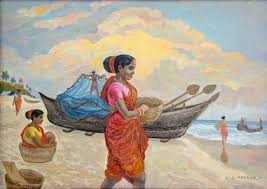Amidst the swirling currents of conflict and societal constraints, a remarkable community thrives in Kashmir. These are the fisherwomen, navigating a landscape fraught with challenges, yet emerging as symbols of resilience, determination, and entrepreneurial spirit. Their story, etched against the backdrop of Kashmir’s turbulent past, serves as a powerful testament to the indomitable human spirit and the unwavering pursuit of a better life.
The very act of being a fisherwoman in Kashmir is an act of defiance. The region’s history is marked by strife, casting a long shadow of uncertainty over everyday life. Yet, the fisheries sector has stood firm, offering a lifeline to countless families. It is a testament to the unwavering spirit of these women, who venture out each day, undeterred by the ever-present threat of violence and instability.
At the forefront of this thriving industry are women like Nayeema and Shamshad Bano. Their unwavering resolve shines through their unwavering presence on the streets of Srinagar, even in the face of potential danger. Their stories are not unique; they represent the collective spirit of countless Gadhanzen, as the fisherwomen are called, who stand as pillars of strength for their families and communities.
The narrative of Kashmiri fisherwomen transcends mere survival; it speaks volumes about the transformation of gender roles within the المجتمع (community). Traditionally, fishing was a male-dominated domain. However, with changing times, women have stepped up, taking center stage in the sale of the catch. This shift not only empowers them economically but also challenges age-old societal norms, paving the way for a more equitable future.
The Gadhanzen are not merely redefining roles; they are shattering stereotypes. Their distinctive attire, a departure from societal expectations, serves as a powerful symbol of their individuality and their refusal to be confined by conventional norms. They are redefining what it means to be a woman in Kashmir, demonstrating that strength, determination, and entrepreneurial spirit can reside within anyone, irrespective of gender.
The impact of these women extends far beyond the economic realm. They serve as beacons of hope, inspiring future generations to dream beyond limitations and defy societal constraints. Their unwavering spirit in the face of adversity sends a powerful message: that even amidst the most challenging circumstances, the human spirit can persevere, and dreams can be achieved.
However, the narrative of the Kashmiri fisherwomen is not without its challenges. The ever-present threat of violence is a constant source of worry, impacting their mental and physical well-being. Additionally, environmental concerns like water pollution pose a significant threat to their livelihood and the sustainability of the fishing industry.
Addressing these challenges requires a multifaceted approach. Ensuring their safety and security through robust law enforcement mechanisms is paramount. Additionally, investing in infrastructure development, providing access to proper sanitation facilities, and implementing stricter environmental regulations are crucial steps towards safeguarding their well-being and the future of the fisheries sector.
In conclusion, the story of the Kashmiri fisherwomen is an ode to human resilience and the unwavering pursuit of a better life. They stand as testaments to the power of defying the current, challenging norms, and carving their own destinies. As we move forward, it is imperative to acknowledge their contributions, address the challenges they face, and empower them to continue their remarkable journey, inspiring generations to come. Their unwavering spirit serves as a beacon of hope, reminding us that even in the face of adversity, the human spirit can prevail.



